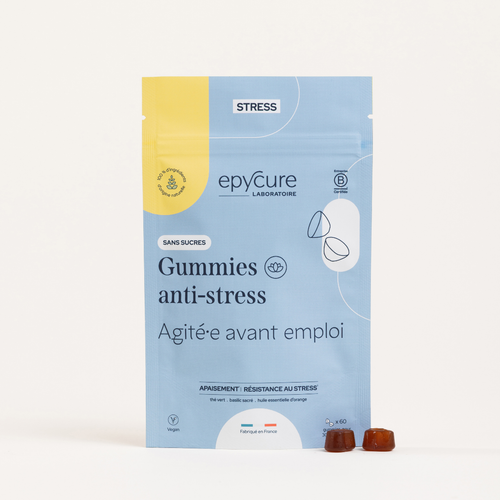Stress and anxiety are normal body reactions to imminent danger or the perception of danger (which may not actually be danger). They are accompanied by the release of hormones—cortisol and adrenaline—that promote alertness and activation, and are necessary to cope with these dangers or threats and find solutions.
However, because they “pause” functions deemed non-vital to combat this danger—such as digestion, immunity, or sexual and reproductive functions—these reactions become problematic when they become too intense or disproportionate to the stimulus that precipitates them, too long-lasting, or too frequent. So how can you combat stress naturally? Here are our top tips:
Regulate your blood sugar
A diet rich in processed foods, flours and refined sugars causes spikes in blood sugar (blood sugar levels) followed by reactive hypoglycemia which leads to the famous energy crash: a strong feeling of fatigue, and a compulsive need for sugar (beware of the vicious circle!). If they occur regularly, reactive hypoglycemia promotes chronic fatigue, a decrease in concentration and alertness, as well as an increase in stress levels and the onset of anxiety disorders in the medium term.
In practice: avoid processed foods, which are often overly sweet. Adopt a low-glycemic diet consisting mainly of non-starchy vegetables, but also whole grains and fruits as snacks. And finally, always add quality fats and proteins to your meals to lower their glycemic index and help maintain a stable mood.
Take care of the quality of your sleep
Studies show that sleep deprivation significantly increases our brain's anticipatory activity. This anticipation is a survival mechanism and serves to prepare us for dangerous situations. But when it becomes exacerbated, chronic, and turns into hyper-reactivity, it becomes harmful and can lead to stress and anxiety disorders.
In practice:
- Try to sleep in the dark
- Maintain a good temperature in your room (around 19°C).
- Go to bed at the same time every day (roughly!)
- Turn off screens and electronic devices at least 1 to 2 hours before bedtime.
Limit caffeine
The caffeine in coffee and tea is a highly stimulating substance that promotes the release of cortisol and adrenaline, stress hormones that make us feel awake, alert, and more productive, but can also generate great anxiety by increasing pulse, blood pressure, and sweating, and by blocking the secretion of adenosine, a substance that helps relax our brain. Furthermore, coffee is considered acidifying, which means that its metabolism mobilizes a very large amount of minerals, sometimes leading to deficiencies, especially of magnesium, a mineral that plays a key role in physical and emotional relaxation. It is a very effective remedy for muscle tension.
In practice: if you are an anxious or stressed person, replace tea or coffee with non-caffeinated hot drinks such as infusions and herbal teas, or chicory.
Move
The body's stress response triggers a surge of hormones that prepares the body to fight or flee... even when the threat isn't a predator but an email from your boss or a remark from your spouse and you're happily sitting at your desk or on your couch. However, when this excess energy is not used, the secreted adrenaline, noradrenaline and cortisol will circulate freely in your blood for several hours after the "threat" has disappeared, causing irritability, nervousness and anxiety, and worsening anxiety disorders and depression.
In practice: Practice conscious movement activities like yoga, tai chi, or chi kung that will help you connect with your body's sensations and regulate them through movement.
Stimulate your vagus nerve
Neuropsychology experts are increasingly interested in the link between the vagus nerve and stress. The vagus nerve is part of a branch of the nervous system that activates when we rest, repair, and relax: the parasympathetic nervous system. However, when the vagus nerve is understimulated, we may struggle to achieve states of calm and serenity. We then remain “stuck” in states of alert and overactivation (called fight or flight mode in psychology), which, when they become chronic, can lead to anxiety and depression.
In practice:
- Maintain positive social relationships
- Expose yourself to the cold (by finishing your showers with cold water, for example)
- Practice abdominal breathing or cardiac coherence daily (5 minutes a day is enough)
- Sing!
Discover the relaxing power of plants
Phytotherapy, or the use of plants for their medicinal properties, is a very effective way to combat the negative effects of stress . Long considered simple grandmother's remedies, adaptogenic plants are particularly appreciated today for their ability to balance, restore, and protect the nervous system. They help the body regain normal physiological functions after a stressful situation.
In practice:
- Take courses of rhodiola, ginseng or ashwagandha , which are the most well-known plants for boosting energy and combating the effects of stress .
- Although not an adaptogen, griffonia is a plant that contains 5 HTP, a precursor to serotonin that is extremely useful in combating anxiety disorders. It can also be taken as a treatment.
- Prepare valerian infusions, which have been used for thousands of years to treat nervousness, anxiety disorders and sleep disorders.
Adopt essential oils
Essential oils are the soul of flowers and plants: powerful extracts that, in small quantities, can provide us with a huge amount of benefits. Essential oils are the product of distilling natural elements, such as flowers, trees, leaves, wood, resins, roots, and fruit peels, from which all their wonderful healing properties are extracted. Their medicinal use is called aromatherapy. The most useful anti-stress essential oils are: lavender, neroli, ylang ylang, petitgrain bigarade, and all oils derived from citrus fruits (lemon, grapefruit, bergamot, mandarin, etc.).
In practice:
- Add 10 drops of your favorite essential oil to your bath and maximize your state of relaxation
- Use an essential oil diffuser to breathe in their aroma and get a subtle dose of well-being
- Dilute a few drops of essential oils in your favorite cream or oil and take the time to give yourself a relaxing massage.
And of course, reduce stressors from your lifestyle by maintaining a balanced diet rich in fruits and vegetables, quality proteins and healthy fats, avoiding overwork, and limiting your exposure to toxic or controversial substances from household products and cosmetics.
Sources:
- https://www.euphytosegamme.fr/tout-sur-le-stress/quelques-conseils-pour-destresser-rapidement-et-simplement/
- https://www.nutrimea.com/article/stress-remedes-naturels/
- https://www.cosmopolitan.fr/,7-solutions-anti-stress-pour-la-rentree,2230,1062112.asp
- https://madame.lefigaro.fr/bien-etre/cinq-astuces-de-grand-mere-pour-lutter-contre-le-stress-010115-2442
- https://www.passeportsante.net/sante-mentale-et-emotive-c41/vaincre-le-stress-46 :



